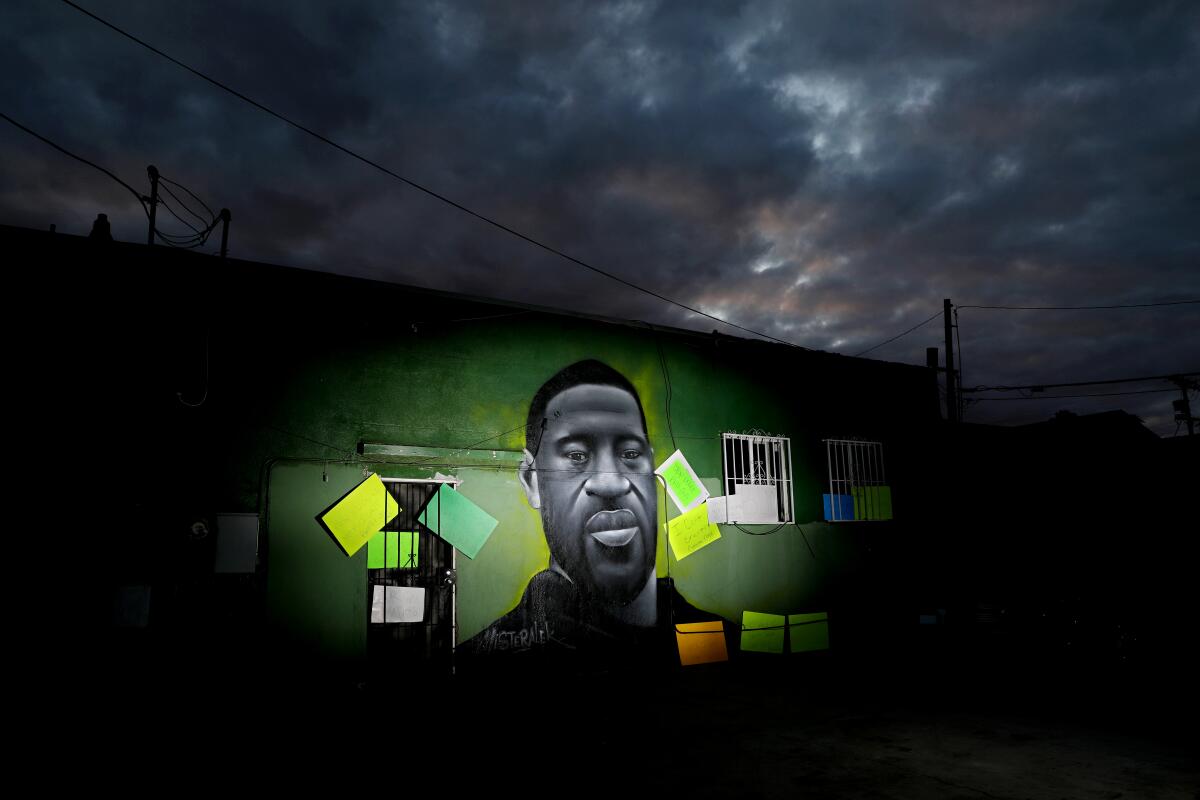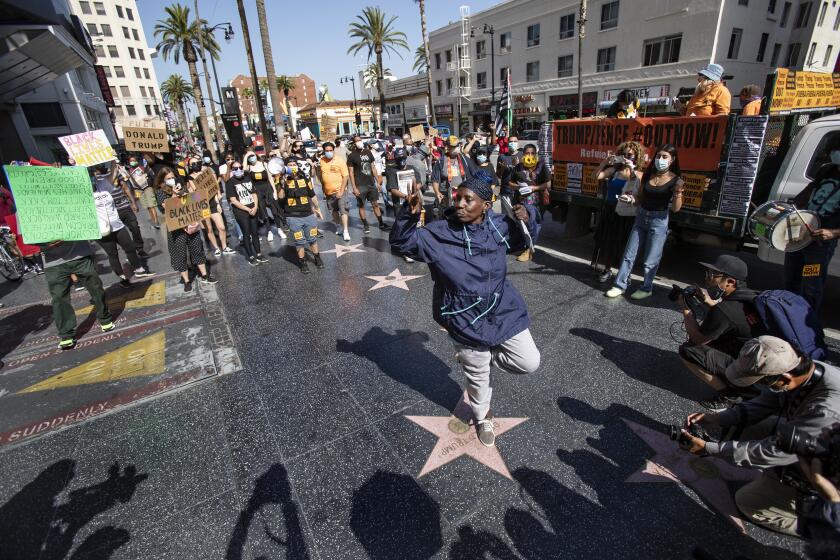After George Floyd’s death, a time to listen and learn

- Share via
So many people are talking now. I have resolved to listen.
It’s the respect that is being requested of those of us who are not black by the leaders of the protests filling our streets in the wake of the killing of George Floyd.
They have been fighting for justice for years without the enormous support they’re now getting. It doesn’t seem to me too big an ask in the moment.
And so I have started to collect voices that say things I think need to be heard in this time of extraordinary truth telling.
When news broke of George Floyd’s death, I was making my way for the second time through “The Warmth of Other Suns,” Isabel Wilkerson’s Pulitzer-Prize-winning account of the Great Migration, in which nearly 6 million black Americans left the South for the North over more than half a century in hopes of better futures, free of the kind of injustice that often got a black person lynched or burned alive, on the flimsiest of accusations, without the slightest attempt to ascertain truth.
That’s what I was thinking about when I first saw Floyd die on video, before I even knew that his own family members had been part of that migration.
All of us have seen again and again how Derek Chauvin used his knee to squeeze the life out of Floyd. Many of us have knelt and stood in silence for the 8 minutes and 46 seconds that Chauvin kept that knee pressing down.
But a whole race has been pressed down in so many ways for four centuries, the Rev. Al Sharpton said Thursday in words that I know will long echo.
“The reason we could never be who we wanted and dreamed of being is you kept your knee on our neck. We were smarter than the underfunded schools you put us in, but you had your knee on our neck. We could run corporations and not hustle in the street, but you had your knee on our neck,” Sharpton said in his Minneapolis eulogy for Floyd.
“We had creative skills, we could do whatever anybody else could do, but we couldn’t get your knee off our neck. What happened to Floyd happens every day in this country, in education, in health services and in every area of American life. It’s time for us to stand up in George’s name and say, get your knee off our necks.”
The death of George Floyd sparked protests in Minneapolis, Los Angeles and New York. The officer who knelt on Floyd’s neck was charged with third-degree murder and manslaughter on Friday.
I’ve been thinking about why this moment feels different from countless others in recent years when we’ve learned of the wrongful killing of a black person by police. Listening to Trevor Noah’s take on the wave created by a series of dominoes falling in short order was helpful.
In a recent monologue, Noah, the host of “The Daily Show” who grew up under apartheid in South Africa, put perfectly into words exactly what it was that made a Memorial Day encounter in New York’s Central Park between Amy Cooper, a white woman walking her dog, and Christian Cooper, a black man who was bird-watching, such a catalyst in the growing outrage that, followed by Floyd’s death, led thousands to our streets.
Christian Cooper was trying to get Amy Cooper to put her dog on a leash. She threatened to call the police and say an African American man was attacking her and then did just that.
The video Christian Cooper took of the exchange went viral at a time, Noah argued, that already was particularly raw.
“Think about how many black Americans just had read and seen the news of how black people are disproportionately affected by coronavirus and not because of something inherently inside black people but rather because of the lives black people have lived in America for so long,” Noah said. “You know coronavirus exposed all of it, and now here you have this woman who ... blatantly knew how to use the power of her whiteness to threaten the life of another man and his blackness.
“It was like a curtain had been pulled back” on structural racism, he said.
“She was like, ‘Oh I know. I know that you’re afraid of interacting with the police because there is a presumption of your guilt because of your blackness. I know that as a white woman I can weaponize this tool against you. And I know that by the time we’ve sifted through who was right or wrong, there’s a good chance that you will have lost in some way shape or form.’ ”
The devastating video of Floyd’s killing, Noah pointed out, was similarly revealing: how calm Chauvin was as he killed him, how Floyd clearly posed no danger to his safety.
“There was a black man on the ground in handcuffs and you could take his life so you did, almost knowing that there would be no ramifications,” Noah said.
I listen for a living. Over the years, I’ve collected a multitude of views about the world in which we live. As a columnist, I now regularly share my own views. Not doing so, even in the moment, doesn’t come naturally.
Thinking about that, I reached out to Anna Deavere Smith, who has spent many years helping us collectively examine our attitudes toward race by interviewing a diversity of people about such moments as the 1992 L.A. riots and the 2015 death of Freddie Gray in police custody in her hometown of Baltimore and then portraying them, speaking only their own words, in multi-character one-woman shows.
In my mind, she is one of the all-time-great listeners. Her work offers us a rare opportunity to see how differently people of different backgrounds can process and interpret the same set of events.
Smith told me that she’s seen too many tragic events such as the killing of Floyd to be able to say with confidence that the current protests are a turning point. “The window is so small and the curtain opens just a little bit when these things happen and then we have a very short memory and it closes again.”
But she said she was heartened by the great mix of people in the protest crowds, which she believes has something to do with the more truthful versions of our nation’s experience that many young people are now learning in school, thanks to those who fought to include stories far beyond those of white men.
“I think what that has done to some extent is caused people who are not black to have more questions about what’s right, what’s wrong, what’s fair, what’s not fair,” she said.
She also spoke to me about how her own work and life have been so enriched by allowing in many different voices, by listening to many points of view, by creating a way “for people to step into each other’s shoes.” It helped her, she said, to “recover from what de facto segregation did to me.”
“I really believe that there’s a benefit to chasing that which is not you,” she told me.
So do I. I think that it is work that is necessary to understand and feel other people’s struggles deeply enough to fight for their lives as hard as you’d fight for your own.
More to Read
Sign up for Essential California
The most important California stories and recommendations in your inbox every morning.
You may occasionally receive promotional content from the Los Angeles Times.












